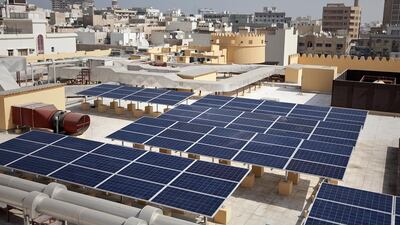Despite the great wealth the oil and gas industries have brought, these two natural resources are not the most abundant potential sources of energy in the UAE. That honour belongs to the sun, of course.
The Shams Solar Power Station in the Western Region of Abu Dhabi is already geared to provide electricity for 20,000 homes, and there are plans for its expansion and further commercial application. And, as The National reported this week, Abu Dhabi's Regulation and Supervision Bureau has begun issuing self-regulating licences to allow private property owners to install photovoltaic cells on the roofs of their homes to generate their own electricity.
Given the cost of generating electricity in the conventional manner – and the country’s stated aims of diversifying the economy and moving towards cleaner energy – it seems logical that householders be encouraged to do their bit in harnessing solar power for personal use. Even the use of simple rooftop solar water heaters would help reduce electricity demand.
While few premises will generate enough power to fulfil their own needs, the potential exists for some private residences to feed electricity into the national grid. This will become especially viable when next-generation solar panels, made of magnesium chloride cells or graphene film, come on to the market and are incorporated into the roofs and walls of high-rise buildings, greatly enhancing the opportunity to capture this valuable, yet free, resource. In the UAE, this would require some form of “feed-in tariff”, whereby the government would pay individuals a set tariff for the surplus power they generate in their homes. Although the new panels are some years away, the mechanism for feed-in tariffs should be created now.
While the new Barakah nuclear power plant has been designed to bear much of the load, the demand for electricity is increasing at an annual rate of 6 per cent, and other solutions will be needed. The money that might be used to build power stations could be used to subsidise individuals who install solar panels. Encouraging a mix of sources will help ensure the continuity and security of supply that the UAE will need to power its future.

